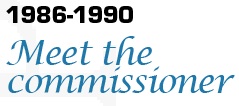The elevator doors open and Harvey Schiller springs forward onto the fifth floor of a New York high school in Hell’s Kitchen. His athletic, 6-foot-4 frame is upright, his head is held high and his thumbs are tucked behind his belt buckle into the waist of his navy slacks. He strides down the hallway like a lead actor in a John Ford film. His white hair is closely cropped and his blue eyes skip across the college pennants hanging from the ceiling before settling on a shorter man in a tie and blousy white shirt.
“JOSHUA!” he bellows and extends his hand.
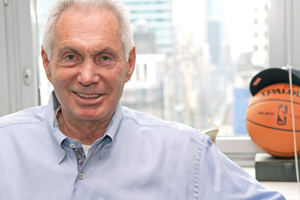 |
Photo: PATRICK E. MCCARTHY
|
“Hello,” says Joshua Solomon, the principal at the Business of Sports School, who reaches out to shake Schiller’s hand. “It’s nice to see you. Thank you for coming to see the kids.”
Schiller, who has co-chaired the school’s advisory board for four years, follows Solomon down the hall and into the school office. He slides into a chair at a circular table and surveys a group of four students who have assembled to ask him questions about his career. But before the interrogation can begin,
Schiller plucks a red paperback book from the center of the table and reads the cover aloud.
“The 100 Greatest Answers to the Toughest Interview Questions,” Schiller says, flipping to page 96. “’If you’re happy at your current firm, why are you looking for another job?’” He snickers and looks up at the students with a grin. “That’s the story of my life.”
Schiller’s résumé runs on for pages and he shares much of it with the kids. Vietnam War pilot. Chemistry professor. Air Force colonel. Southeastern Conference commissioner. Head of the U.S. Olympic Committee. President of Turner Sports. The boss at YankeeNets.
When he finally pauses, senior Emony Robertson says she has a question.
“What has been your motivation for all your career changes?” she asks.
“I would say a commitment to excellence,” he says. “You have to set your own standard for things. It doesn’t matter if it’s sports or business. If you only try to beat the competition, that’s the best you’ll ever be.”
Schiller may have inspired the kids with his words, but he didn’t answer the question. At least not directly.
What motivated him wasn’t a commitment to excellence. It was an aversion to complacency and a hunger to learn and master something new. That mixture swelled up inside him every four or five years in the form of a single question that he asked himself over and over again. What’s next?
What is next?
The boy grew up in Brooklyn, in Flatbush, and that’s where the question “what’s next” first began.
The boy lived in a second-floor apartment in a mostly Italian neighborhood. His father drove a delivery truck and showed little interest in or ambition for anything else. Two of his father’s brothers did the same thing. The only brother who didn’t drive a truck served in World War II, was wounded during D-Day and gave the boy his Purple Heart.
The contrast between his father, who went nowhere, and his uncle, who was recognized for serving his country, gave the boy his first glimpse of what could be next in his life. But it was the boy’s mother who equipped him to get there.
|
| Executive editor Abraham Madkour talks with staff writer Tripp Mickle and assistant managing editor Tom Stinson about Harvey Schiller and the 2013 class of Champions of Sports Business. |
She was a hardworking, self-educated, first-generation immigrant from Poland who prodded him to get the best education he could. She bought a set of encyclopedias when he was 5 and encouraged him to read it from A to Z. She pushed for him to go to Erasmus Hall, one of Brooklyn’s best and oldest public schools, and found a way for him to enroll there because it offered Latin, a subject the school he was zoned for didn’t teach.
The boy wasn’t playful, gregarious or commanding. He was a shy, average student, who never had a girlfriend. But he played end on the football team and a soon-to-be-famous Erasmus alum named Al Davis, who was an assistant coach at The Citadel, recruited him to play football.
The boy didn’t really have an alternative. He could stay in New York, work during the day and go to a city college at night, or he could go to military school in Charleston, S.C. He had no idea what he was getting into, but he had found what was next.
The cadet showed up on the palm-tree-shaded campus completely unprepared. Everyone yelled at him. Turn right. Turn left. Drop and give me 20. He was tired. He couldn’t sleep. And he weighed 175 pounds soaking wet.
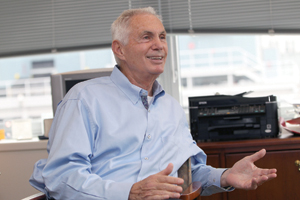 |
Harvey Schiller has amassed one of the most impressive résumés in sports by having an aversion to complacency and a hunger to learn something new.
Photo: PATRICK E. MCCARTHY
|
He came to play football, but he didn’t stay on the team long. The truth was he couldn’t handle football and school. He flunked freshman algebra. He watched two-thirds of his classmates flunk freshman English. To keep up academically, he dropped football, concentrated on his studies and developed a passion for pranks that injected life into the regimented world of gray and white uniforms.
He had a roommate who tried to squeeze in naps between class and roll call. If the roommate had 10 minutes, he would run into the room and jump on the upper bunk where he slept. So one day, the cadet removed the supports from under his bed and when the roommate landed on it, the mattress plummeted straight to the floor. He damn near killed him, but he and his other bunkmates laughed their asses off.
When he wasn’t pulling pranks, he was studying. He didn’t qualify for chemistry classes at Erasmus, but he was determined to major in it at The Citadel. Class came easy to him after he gave up football. He did so well that a chemistry professor encouraged him to apply for a graduate fellowship in chemistry at the University of Michigan. At the same time, a friend was taking the Air Force pilot’s test, so he did the same thing.
The cadet’s parents came to see him graduate. He was the first in his family to earn a college degree. But just as important as the degree was The Citadel ring he earned and the confidence and self-assurance he discovered during those four years. He also had found what was next.
The pilot joined the military straight from graduate school at Michigan. He had just married a young student he met in his nursing chemistry class whom he convinced to drop the course so they could date. And he was excited to serve the same way his uncle had in World War II.
He spent a year learning to fly. Sitting at the front of a jet engine was his kind of fun, full of challenges and conditions he couldn’t control. Losing an engine. Flying in wind and rain. Landing in snow.
After a few years of training, he went to Vietnam and learned what they called “decisive originality.” Back home in the States, flight patterns were controlled and repeated, but in Vietnam, controlled and repeated flight patterns ended with planes being shot down.
Pilots had to be innovative and original each time they landed. They had to land at night on a 2,000-foot runway between rows of rubber trees in Viet Cong territory. The young lieutenant excelled at decisive originality. He sailed through orientation, got his own crew and began flying supplies to troops on the ground.
The wartime flights consisted of hours of boredom broken up by moments of terror. His plane came under heavy fire during one mission. He was delivering supplies to special forces in a compound near the Cambodian border. Some guys would have flown the plane home. Forget the troops and save their own butt. But he didn’t go home. He knew those troops needed ammunition, so he made multiple passes. The plane took fire from .30-caliber anti-aircraft guns, but eventually they made the drop. And when he returned, they gave him the Distinguished Flying Cross.
He left the war in 1967 and became an instructor at the Air Force Academy. They sent him back to Michigan to get his doctorate in chemistry, and the Ph.D. prepared him for what came next.
The professor arrived at the Air Force Academy in 1972 and earned a permanent appointment eight years later from President Jimmy Carter.
He awed students with tales of the thousands of hours he’d logged flying, and the 1,230 combat missions he flew in Vietnam. He was distinguished looking, tall and broad-shouldered, and he had a presence so commanding that when students passed him in the hall, they would say, “Hello, sir,” and scurry away.
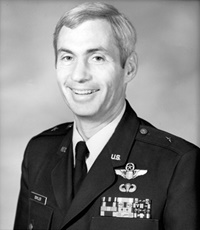 |
Schiller was a colonel and professor at the Air Force Academy in the 1970s and ’80s.
Photo: COURTESY OF HARVEY SCHILLER
|
But beneath his imposing appearance was a concern that won students over. He often started class by asking how students were doing.
“It’s getting to be a busy time with exams,” he’d say. “How are you all holding up?”
And he always kept students guessing with new, playful pranks that broke up the regimentation of academy life. If students seemed unengaged, he would flip off the lights and walk out of the room. If they hadn’t had an exam in a while, he would tell them to put away their books and take out a piece of paper and pencil.
“I know I didn’t tell you there was going to be a quiz today, but there’s going to be a quiz,” he’d say. The class would moan collectively. He’d let it sink in, then he’d say, “Oh, I know you’re all prepared. You can put your papers away.” And a grin would spread across his face as the cadets sighed with relief.
The professor loved teaching. He loved working with students. But year after year of teaching chemistry, talking about thermodynamics and coordination compounds, began to bore him, and he began to deliberate on what he should do next.
The volunteer heard that the U.S. Olympic Committee was bringing its first National Sports Festival to the Air Force Academy in the late 1970s, and he offered to help with the boxing venue. He scheduled matches. He set up the ring. He connected with the Amateur Athletic Union, a predecessor to USA Boxing.
Four years later, the organization lost 14 boxers and eight officials in a plane crash in Poland, and the volunteer offered to go and identify their remains. He got a 30-day leave from his teaching duties at the Air Force Academy and flew to Warsaw. He became as involved in boxing domestically as anyone, and when the Los Angeles Games asked the organization for the name of someone who could run the boxing venue at the 1984 Olympics, he volunteered.
At the same time he was beginning to work on the Los Angeles Games, he began to get more involved with the NCAA, where he was volunteering as the Air Force Academy’s faculty representative. He joined the executive committee and worked on new rules that tightened academic standards for athletes.
In Los Angeles, he worked for Ken Shropshire, a then-27-year-old attorney. The way Peter Ueberroth organized the Games, each venue had its own profit and loss ledger. It had to raise money to fund its operations, and it had to control its expenses. It was the volunteer’s first experience with a P&L. It also was his first experience scheduling an event for television. He and the team there excelled at both, so much that the boxing venue was considered one of the most successful at the Games.
The experience opened his eyes. For years, he had imagined he would live out his days teaching chemistry at the Air Force Academy. But after the Olympics, he started to think about what he could do next.
The commissioner never thought he would get the job running the Southeastern Conference. NCAA Executive Director Walter Byers recommended him for it. He flew to Alabama and attended a going-away party for his predecessor, Boyd McWhorter. But he felt like it was more an early coronation party for Roy Kramer, who seemed destined to get the SEC job.
The next day, he went to be interviewed at the Central Bank Building in Birmingham. He walked in the room and sat down in front of the 10 presidents and chancellors. At one point, one asked, “How can we make the Sugar Bowl as attractive as the Rose Bowl?”
“Well, you can move Disneyland to New Orleans,” he said.
 |
At the SEC, Schiller set about improving the conference's image nationally.
Photo: COURTESY OF THE SEC
|
“How do you think it’s going to be to pick somebody from the military?” another chancellor asked later. “We’re going to be accused of having someone with a military mind.”
“You know,” he said, standing up. “I don’t think it’s so bad for this conference to pick someone from an institution where you don’t lie, cheat or steal, and you certainly don’t tolerate it. Have a nice day.”
And he walked out. He called his wife from the airport and told her not to worry. They wouldn’t be moving to Birmingham, he wasn’t getting the job. But a few days later he got a call from University of Mississippi Chancellor Gerald Turner, who offered him the position.
The SEC wanted an academic. Someone who showed that a conference plagued by NCAA-compliance issues cared about education and integrity. And they asked that the 47-year-old go by Dr. Schiller. Not colonel.
He was charged with improving the conference’s image nationally and with the NCAA, and he set about doing that immediately. At his first NCAA meeting that January, he left an executive committee meeting and looked for the SEC’s athletic directors and staff in the main ballroom. He finally found them in the back of the room.
“What are we doing?” he asked incredulously.
The next morning, long before the meetings began, he got staff to place reserved placards at the front tables. The Big Ten and Pac-10 usually sat there. They couldn’t believe it. So the next morning they sent their staff in to reserve the tables even earlier. The three conferences ultimately made a gentlemen’s agreement to mix up who sat up front.
But the new commissioner did more than just change the SEC’s image. He also boosted its bottom line. He introduced the first sponsorship program the conference had ever had and signed a local Pepsi bottler and Birmingham-based Golden Flake to the first deals. He also read the NCAA rulebook and turned the conference on to the fact that adding two more schools would allow it to create a football championship.
It was a discovery that upset the NCAA, which believed the rule was for nonrevenue sports, and it coincided with a flurry of activity on conference expansion. The SEC began fielding inquiries from Texas and Texas A&M. It talked with Georgia Tech, Florida State, Miami, Arkansas and South Carolina, too.
But before the conference ever expanded and before the sponsorship coffers grew significantly, the commissioner got the four-year itch. What was next?
The executive director joined the U.S. Olympic Committee full time in 1990. It was his second stint in the job. Confused? So was he. Two years earlier he accepted the USOC’s top job, held it for 19 days and rescinded it to return to the SEC. He felt the USOC’s board was too involved in day-to-day management, and conference expansion conversations were just beginning. It was a rare moment of indecision that would chafe him the rest of his life.
But when they approached him again in 1989, he left without hesitation. He brought with him a culture of accountability. His nameplate read “Don’t Screw Up,” and staff joked that it only said that because human resources forbade his preferred word. He often stood at the front desk and greeted staff who weren’t at the office by 8 a.m.
 |
Schiller brought culture change and diversity to the U.S. Olympic Committee.
Photo: USOC ARCHIVES
|
During presentations, he often asked staff, “Did you think of this?”
“No,” they’d say.
“Do I have to think for everyone in here?” he’d ask, causing them to cower and shrink. “Because if I do, why do I need you?”
Staff lived on edge. No one wanted to land in his crosshairs. But it was an edge that they said energized and improved the organization.
Mike Moran, the top communications official at the time, recalls being called into Schiller’s office right before he was about to leave for a vacation. He found the executive director and his chief of staff, Tom Wilkinson, waiting for him. Moran thought he was being fired.
“Are you happy?” the executive director asked.
“Yes,” Moran said. “Why?”
“I don’t know. I just see you leaving and you shuffle to your car with your head down. You don’t look happy,” the executive director said, pausing for what seemed like minutes. “Don’t worry about it.”
Moran went on vacation, and all he did was worry about it. He learned years later that the military dropped the are-you-happy question on staff to motivate them. And when he came back, he was motivated.
And part of the reason Moran and others stayed inspired was because the executive director balanced the tension he created with collegiality. He knew Moran liked baseball, and he occasionally tapped on Moran’s office window, held up a glove and motioned for Moran to come play catch. He brought out a golf club and drove a 3-wood toward the old military barracks at USOC headquarters with another staffer who loved golf. And he regularly organized spontaneous touch football games where he played quarterback.
But the executive director didn’t just change the culture. He also brought in new talent. He created a management trainee program to hire young people and improve the organization’s diversity. He brought in Charles Davis, who worked with him at the SEC, and Michael Jackson, a former Georgetown basketball player, and Jenny Storms, a former competitive skier.
The pranks that marked his cadet years at The Citadel and teaching years at the Air Force Academy continued at the USOC. It helped him in at least one business deal. In 1992, the organizers of the Atlanta Olympics wanted to finalize their joint-marketing agreement with the USOC during an International Olympic Committee meeting in England. The executive director wanted to do it after he got back to the U.S. and reviewed the documents with his general counsel. To block the Atlanta group from faxing the contract back to Colorado Springs for immediate review, he told his lawyer to jam the fax machine.
“Start faxing the Bible,” he said.
But an equally playful decision backfired in 1991. That year, he included a note with the USOC’s annual funding check to the U.S. Ski Association that said, “Where’s the ski pass?” The head of skiing didn’t get the joke and went to the press, alleging the USOC only gave the organization money because its top executive wanted favorable treatment. An investigation ensued that cleared the executive director of wrongdoing, but his reputation was damaged.
He repaired it with each of the USOC’s accomplishments during his tenure. While he was there, the organization increased funding to athletes and began awarding money for gold ($25,000), silver ($15,000) and bronze ($10,000) medals for the first time. It started the Share the Dream program that saw Ernst & Young and Olsten Corp. combine to mentor and assist Olympic athletes seeking jobs. It undertook a $38 million renovation of its Olympic Training Centers, and it increased its revenue by 33 percent ($299 million to $400 million).
But the four-year itch struck him after the 1994 Winter Olympics. He began to feel like he’d done everything he could to change the USOC. He wanted to learn something new. He wanted what was next.
The Doc is what they called him at Turner. Not Dr. Schiller. Simply “Doc,” the first president of Turner Sports.
He walked into the job with no direct TV experience. He had negotiated TV contracts at the SEC and USOC, but he had never worked for a media company. Turner hired him to oversee more than 900 hours of sports programming, manage the Goodwill Games and supervise the WCW, the company’s wrestling property.
He hung a periodic table in his office and tried to bring some of the structure he introduced at the USOC to Turner. He created a sign-in sheet for people to write down when they arrived at work. But when staff told him that TV people worked odd hours, traveled a lot and shouldn’t have to sign in, he dropped it.
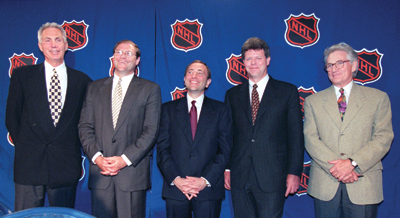 |
Schiller became the first president of Turner Sports, shown in 1997 with NHL Commissioner Gary Bettman (center) when the Atlanta Thrashers were granted an expansion franchise.
Photo: AP IMAGES
|
He traded punctuality for other idiosyncrasies. During interviews, he asked job candidates riddles, he dropped chemistry questions — “What is the formula for salt?” — and he told them to stand beneath a line he marked on his wall.
“Oh, I’m sorry,” he’d say. “You’re not tall enough.”
It was all designed to put them on their heels and see how they would react. If someone answered the riddle, he knew they could think analytically. If someone said sodium chloride, he knew they thought about the world beyond sports. And if someone shrugged off the height comment, he knew they could handle pressure.
The first thing he did to improve Turner Sports was secure money to upgrade it. He spent more than $500,000 renovating the entire eighth floor of CNN Center. He hired producer Mike Pearl away from CBS and bolstered the production budget. NBA Commissioner David Stern said the changes paved the way for the Emmy Award-winning success of TNT’s “Inside the NBA.”
He was always thinking of the next thing. He explored buying the English Premier League team Arsenal and approached the Frances with an offer to buy NASCAR. After his boss, Terry McGuirk, passed on renewing the NFL rights deal in 1997, he worked with the NBA and NBC on an alternative football league. It was a plan that became the framework for NBC and Vince McMahon’s XFL. And he successfully worked with the NHL to bring hockey back to Atlanta in 1997 with an expansion franchise that Ted Turner named the Thrashers.
No idea was too farfetched. No problem too difficult to solve. When Liberty Media’s John Malone took control of Turner’s SportSouth network after the Time Warner acquisition, the Doc was left with no outlet for 30 Braves baseball games. The deal with Malone gave the Doc the right-of-first refusal on the games, and language in his agreement said Turner couldn’t create another sports network, so the Doc came up with another idea.
“I want you to go start an entertainment network,” he told Turner Sports’ general counsel, David Payne.
“Why?” Payne asked.
The Doc smiled. The contract said they couldn’t have a sports network. It didn’t say anything about having an entertainment network that showed 30 baseball games a year. So they created Turner South.
He solved problems like that at Turner Sports, but he ran into a problem when his contract came up in 1999. Negotiations stalled. Some say it was because the company wanted to hand responsibility for the Thrashers over to Stan Kasten, who already ran the Hawks and Braves. The impasse frustrated the Doc, and he began looking for what to do next.
They called him “The Boss’ boss” in a Forbes’ profile after he joined YankeeNets as chairman and CEO. He had been a friend of George Steinbrenner’s, a USOC vice chairman, since his Olympic years.
When Steinbrenner partnered with the owners of the Nets to create a sports conglomerate and launch a network in late 1999, he wanted his friend to run it. The CEO job had huge upside. He received options to buy 3 percent of the network. But it also had downsides. He could lose his friendship with Steinbrenner.
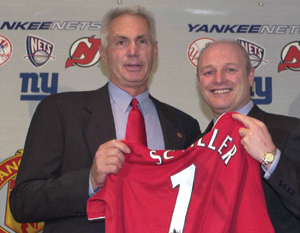 |
As chairman and CEO of YankeeNets, shown in 2001 with Peter Kenyon, then chief executive of Manchester United, Schiller helped bring about YES Network.
Photo: GETTY IMAGES
|
The story in Forbes tested that. The headline angered Steinbrenner. So did some of the facts. He called his new CEO fuming. The Boss’ boss raged right back. The conversation ended with a click. Schiller’s wife made him call Steinbrenner back and they patched things up.
It was early in his tenure at YankeeNets, and it foreshadowed just how hard his job as chairman would be. There were a half-dozen owners he reported to and each one had a different vision for what they wanted. The group hired him because it needed someone that Cablevision, which was at the end of a 12-year, $486 million rights agreement with the Yankees, would respect.
He bumped into IMG’s media leader, Barry Frank, at lunch at the 21 Club and asked him if he could hire IMG to run numbers to determine what a YankeeNets network would be worth. Frank took the job, but he wasn’t totally aware why the Boss’ boss hired him. To exit its deal with Cablevision, which had a right to match any new TV rights agreement, YankeeNets needed to show a judge that it had an offer from someone else to not only buy its media rights but also launch a network. IMG offered to partner on a network and guaranteed $838 million in rights fees.
MSG tried to block the deal in court but lost. When it did, YES was born and Goldman Sachs, the Quadrangle Group, Leo Hindery and Amos Hostetter Jr. paid $340 million to acquire a 40 percent stake in the network. The network’s value today tops $3 billion.
The Boss’ boss, who had helped sell $200 million in bonds to cover the network’s launch, walked away with $16 million. In the eyes of some, he earned a fortune by captaining the team but doing little of the heavy lifting. In the eyes of others, the network would have been impossible without him.
It was the only job he’d held for two years, and it ended before he’d had much time to think about what was next.
The money from YankeeNets changed Schiller’s life. The same kid who grew up in a lower middle class family living in a small apartment in Flatbush now splits his time between homes in Scottsdale, Ariz., and Kiawah Island, S.C. He spends his weeks in New York, where he’s spent the last eight years as CEO of GlobalOptions Group, a publicly traded company that once offered crisis management planning for governments and corporations but sold off most of its assets two years ago.
Schiller, 72, awakens most mornings before 6 a.m. in his midtown Manhattan apartment and works out or plays racquetball. He answers emails and then walks to meet someone for breakfast or to his office on Madison Avenue.
Memorabilia covers his office walls and artifacts line his windowsills. There’s a Don Fehr bobblehead, a U.S. Amateur Boxing trophy from Seoul, an Air Force football and a plaque commemorating his selection as the 44th most powerful figure in sports by The Sporting News.
 |
What is next for Schiller remains uncertain. He’s considered offering to help the NFL improve relations with college football, working with a pro team or even starting a sports network.
Photo: PATRICK E. MCCARTHY
|
His days are a mixture of work commitments and appointments. He’s a consultant to the America’s Cup, advising it on its media plans for its San Francisco races this summer, and he’s vice chairman of the sports practice at Diversified Search. He schedules lunches most days and dinners several nights.
On a recent afternoon, he walked over to the NBA’s offices on 5th Avenue to visit with Stern. They have known each other since he was SEC commissioner in the 1980s and they traveled to Russia and Lithuania together on an NBA exhibition tour with the Atlanta Hawks.
Stern greets him at the door, a mug of coffee in his hand, his collar open and his red tie loosened.
“Come in. Come in,” he says. “To what do I owe this honor?”
They take seats in low-lying leather chairs and begin reminiscing about their trip to Russia before Schiller hits Stern with his favorite question.
“So what’s next in your life?” Schiller asks. “Because I’m at a phase where I’m doing that myself.”
“Feb. 1 begins my countdown of a year,” Stern says. “I’m not saying yes to anything yet.”
“So what are you going to do?” Stern asks.
Schiller has wondered about that a lot lately. He’s thought about offering to help the NFL improve its relationship with college football. Or working with a professional team. He even thinks he has a concept for a new sports network.
“I don’t know,” Schiller says, “but I have a few ideas.”











